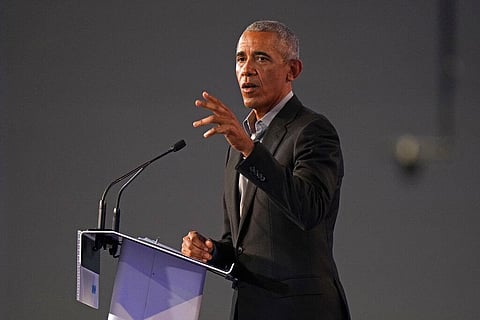

GLASGOW: Barack Obama expressed confidence at U.N. climate talks Monday that the Biden administration will ultimately get its $555 billion climate package through Congress, and faulted U.S. rivals China and Russia for what he called a “dangerous lack of urgency” in cutting their own climate-wrecking emissions.
As nations complained of lagging trust and progress in the climate talks, Obama, one of the leaders who paved the way for the historic 2015 Paris climate deal, threw in a touch of his trademark hope even while talking about “images of dystopia” that were creeping into his dreams.
“There are times where the future seems somewhat bleak. There are times where I am doubtful that humanity can get its act together before it’s too late,” Obama said at the two-week-long negotiations. “We can’t afford hopelessness.”
His comments came as conference leaders acknowledged Monday that many key sticking points exist after a week of talks. A trust gap between rich and poor nations on climate change issues emerged when the negotiations went through a checklist of what's left to be done. Developing countries used the word “disappointing” several times when leaders talked Monday about the progress to date.
The U.N. climate conference in Glasgow, Scotland, is the former American president's first since he helped deliver the triumph of the 2015 Paris climate accord, when nations committed to cutting fossil fuel and agricultural emissions fast enough to keep the Earth's warming below catastrophic levels of 1.5 degrees Celsius (2.7 degrees Fahrenheit).
That celebration has been replaced by worry. Donald Trump pulled the U.S. out of the Paris accord. President Joe Biden put America back in the climate deal as soon as he took office this year but the Trump move set back U.S. efforts for years. Other top polluters — including China, India and Russia — are moving far more slowly on fighting climate change than scientists say is needed.
“1.5 C is on life support now, it’s in ICU,” said Alden Meyer, a long-time observer of climate talks with E3G, an environmental think tank.
Obama's appearance sought to remind governments of the elation that surrounded the Paris accord and urge them to announce more immediate, concrete steps to put the 2015 deal into action. Optimism and unity is required to save the planet, both in the U.S. and around the world, he said.
“It doesn’t matter if you’re a Republican or a Democrat if your Florida house is flooded by rising seas, or your crops fail in the Dakotas, or your California house is burning. Nature, physics, science – they don’t care about party affiliation,” Obama said. “We need everybody – even if we disagree on other things.”
Despite opposition within Biden's own Democratic party that has blocked the president's climate-fighting legislation, Obama said he was confident that some version of Biden's ambitious climate bill will pass in Congress.
“It will set the United States on course to meet its new climate targets,” he said.
And while rapport between U.S. negotiators and their Chinese counterparts was seen as paving the way to the global Paris accord in 2015, Obama on Monday criticized Chinese President Xi Jinping and Russian President Vladimir Putin for not joining other global leaders at the climate talks in Glasgow.
“It was particularly discouraging to see the leaders of two of the world’s largest emitters, China and Russia, decline to even attend the proceedings, and their national plans reflect what appears to be a dangerous lack of urgency,” Obama said.
Obama spoke earlier Monday to a session on Pacific Island nations, including ones whose existence is threatened by rising oceans due to climate change.
“All of us have a part to play. All of us have work to do. All of us have sacrifices to make" on climate, he said. “But those of us who live in wealthy nations, those of us who helped to precipitate the problem ... we have an added burden.”
No deals have been made yet on three main goals of the U.N. conference. Those are pledges to cut emissions in half by 2030 to keep the Paris climate deal’s 1.5 degree Celsius temperature limit goal alive; the need for $100 billion annually in financial help from rich countries to poor ones; and the idea that half of that money goes to adapting to global warming’s worst effects. Several other issues, including trading carbon and the transparency of national emissions commitments, also weren’t solved yet.
Representatives of 77 developing nations, along with China, said until this climate conference produces the financing to help poor nations cope with climate change the talks can't be considered successful. They said announcements on fighting climate change were high in number but worried that they were low in quality.
Ahmadou Sebory Touré of Guinea said rich countries not fulfilling their $100 billion a year pledge to aid poor nations shows they are just making “an empty commitment.”
“There is a history of broken promises and unfulfilled commitments by developed countries,” added Diego Pacheco Balanza of Bolivia.
Scientists say the Earth is only a few years away from the point where meeting the goals set in the Paris accord becomes impossible, due to mounting damage from coal, petroleum, agriculture and other pollution sources. The last few days have seen huge protests in Glasgow and around Europe by young people and others demanding faster action in fighting global warming.
Obama met later Monday with a dozen climate activists, many in their 20s, urging them to keep up their public pressure despite frustrations at the lack of more efforts by governments.
“The question is, where are the countries that really met our expectations? And it turns out, those are the places where there was pressure, where there was political mobilization, where there were activists,” a shirtsleeves-clad Obama said.